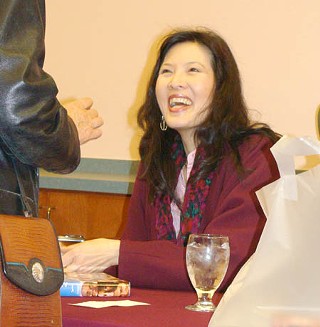Sheryl WuDunn's book Half the Sky: Turning Oppression Into Opportunity for Women Worldwide, co-written with her husband, New York Times columnist Nicholas Kristof, shares stories that show how changing women's lives can change the world, from adding economic opportunity to decreasing violence. The authors hope its buzz creates a social movement to create global and local change. WuDunn was in Tucson on Thursday, Dec. 10, to help the Girl Scouts, the YWCA and the Emerge! Center Against Domestic Violence kick off a community conversation on creating change for oppressed women and girls. For info on the book, visit www.halftheskymovement.org. For more information on creating local change, visit www.thepartnershipforwomenandgirls.org.
You share a lot of substantial research and statistics in the book. Why is that an important part of the women's stories?
We always do that, because it's not enough to tell just the stories. You need to have good, solid research. This topic was very tough. While there has been a lot of research, there hasn't been a lot of high academic research. That's the challenge, but that's beginning to change.
As a society, we've talked about women being integral to improving the economic strength of their families and communities. What makes the Half the Sky movement different?
That's true, that the issue has been around for awhile. But we think right now, we are reaching a tipping point—politically and in the corporate world. For example, in the political sphere, Obama's appointment of his friend Melanne Verveer as ambassador-at-large for global women's issues is important. Another change is that more and more women are working on the development of private and public partnerships. It's also amazing to see Hillary Clinton as a leading figure (and) to passionately talk about these issues. She is taking these policies as far as they've never been before. Her going to Goma (Congo) shows that she's taking it demonstratively more (seriously) than others before her. Goma is the rape capital of the world.
How is the corporate world responding?
In the corporate sphere, one example is Goldman Sachs and its 10,000 Women project (www.10000women.org) to help women in developing countries receive a business and management education. ExxonMobil is also behind similar efforts. Even Walmart more recently is looking at a global focus.
What have you gotten out of this work personally?
For us, when you see a girl who's just been brutalized by a brothel owner, you feel so outraged. You want to tell the whole world. You can't just walk away. It happens at home, too. Brutality exists. Violence against women exists even at home. The magnitude of these problems is sometimes overwhelming overseas. We just think it's important to get the word out and begin talking about how we can make a difference.
You focus on global problems, but isn't it important to work on change here in the United States?
Being part of change at a community level is just as important, but we think we can do both. In the U.S., in particular, if we want to go around and demand change abroad, we need to make sure our own house is in order. Change takes time, but we have to start.
Sometimes, we need a lot of motivation as Americans to become part of a movement.
I think that it can happen. Movements happen from the ground up, at least real, long-lasting change does. But it comes from the people, and they have to demand more from their politicians. (Politicians) are not going to do anything about it unless we hold their feet to the fire. Change happens. Since we've come out with this book, I've just been amazed at how rapidly engaged people have become, how fast it's happened.
After Sept. 11, we almost retreated from the rest of the world. Did you intend for your book to be a reminder that we're part of the big picture?
This world is our world, and we can't put up a gate. Yes, absolutely. Americans can play a great role in trying to fix these global problems. We stand for democracy. And when we go abroad and say, "This is what our country stands for," then how can we allow these things to happen?





